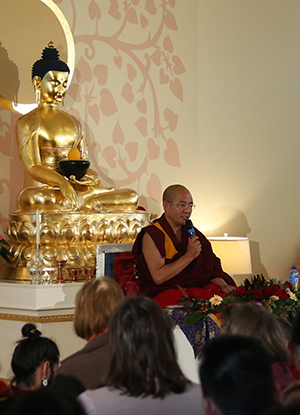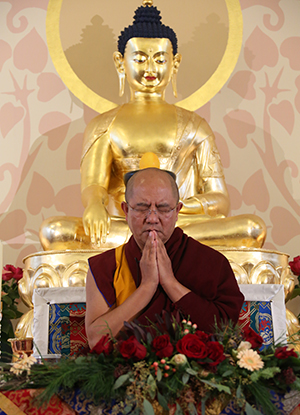Avalokiteshvara Sadhana—the Wish Fulfilling Jewel
In teaching the practice of the four-armed Avalokiteshvara, Khenpo points out the point of training our mind with Buddhist spiritual practices is that they are remedies for the mental afflictions and pressure on people today. Among them, one of the most effective methods is to practice compassion, the mind to unconditionally love all sentient beings. And when one’s mind is full of compassion, this right mind becomes Avalokiteshvara. Therefore, in the end, Khenpo urges everyone to generate the wish of not harming sentient beings and to benefit others, just like Avalokiteshvara.
Spiritual Practice Makes Life Meaningful
Spiritual Practice Makes Life Meaningful
With various changes and events happening around the world, if we are to rely on an external force to fulfill our life, perhaps the life we live is not necessarily meaningful. If instead, we are to have even the slightest realization of our own mind, or in other words, constantly being engaged in spiritual practice, then regardless of what happens in life, we are able to embrace it with bravery and calmness.
Avalokiteshvara Sadhana—Panacea for Mental Afflictions
Globally speaking, people nowadays, especially those who live in cities, indeed have many pressures in life. Today, more and more people are suffering from mental disorders, including depression etc. At this point, they could use a method—the practice of Avalokiteshvara to eliminate the various afflictions in their mind. This is very important to the whole human race and is even more important on an individual level.
In fact, the true Avalokiteshvara is the embodiment of the compassion of all Buddhas of the three times. So this practice first of all, requires us to start from obtaining a balanced state of the mind through the practice of cultivating compassion. Otherwise, if we ourselves are very irascible, it will be difficult to solely rely on Avalokiteshvara to solve our problems. And it is entirely possible that an afflicted person with a harsh original mindset can transform into a happy one fond of helping others through practice within a short period of time.
Simple Way of Altruistic Mind-training
The fundamental teaching of Mahayana Buddhism is to love all sentient beings the way we love ourselves. Yet, due to our egoism, many of us tend to exaggerate and overexpand ourselves, Therefore, a certain gap still exists between us and the standard of Mahayana Buddhism. Because of this, we should understand that it is necessary that we try to enhance our capacity of loving others through the training of our mind. Perhaps the idea of loving “all sentient beings” may be too general for us to evoke any specific emotion. However, a smile to others each day is a simple way to bring happiness and a bestowal of love to other sentient beings.

With various changes and events happening around the world, if we are to rely on an external force to fulfill our life, perhaps the life we live is not necessarily meaningful. If instead, we are to have even the slightest realization of our own mind, or in other words, constantly being engaged in spiritual practice, then regardless of what happens in life, we are able to embrace it with bravery and calmness.
Compassion—the Unconditional Love Toward All Beings
Compassion—the Unconditional Love Toward All Beings
There exists a very simple kind of love in this world, that is the compassionate mind toward all sentient beings or those around us. The worldly love is very limited and fragile, whereas the true heart of great compassion is to love all sentient beings unconditionally. If we possessed the true great compassion, then our mind is Avalokiteshvara.
Through such compassion-related practices as this, gradually the mindset of selfish or egocentric, and negative emotions of pain and afflictions will gradually dissipate. On the other hand, if our mind were not tamed, then we might be prone to develop negative thoughts and attitudes alongside the expanding of our knowledge. These negative thoughts could include arrogance, jealousy, and various deceitful thoughts.
In Buddhism, there is a saying that “Be your own guide, or no one else can.” It means that you are your own teacher and guide. Therefore, we should often observe our mind and behavior. As our altruistic thoughts increase, conversely, the selfish mind will be gradually diminishing.
Benefiting Others Ranks the Most Meaningful Thing in Life
Try to accomplish one single deed of benefiting sentient beings every year, or every month or every day. Of course, it is rather difficult to accomplish such a deed every day; nonetheless, it is still a worthwhile cause if we can have one engagement of benefiting beings as often as possible. This can be the most significant endeavor of our life.
Pith Instruction for Turning Your Spiritual Practice into the Cause of Enlightenment
In whatever Mahayana practice that we engage, first of all, we should try to generate loving kindness and compassion in our mind, and then arouse bodhicitta. In such a case, all practice will become the cause of the supreme perfect enlightenment.

In whatever Mahayana practice that we engage, first of all, we should try to generate loving kindness and compassion in our mind, and then arouse bodhicitta. In such a case, all practice will become the cause of the supreme perfect enlightenment.
“The real Avalokiteshvara is, in fact, this mind of compassion toward all sentient beings, or in other words, ‘ Om maṇi padme hūm’ .”
















